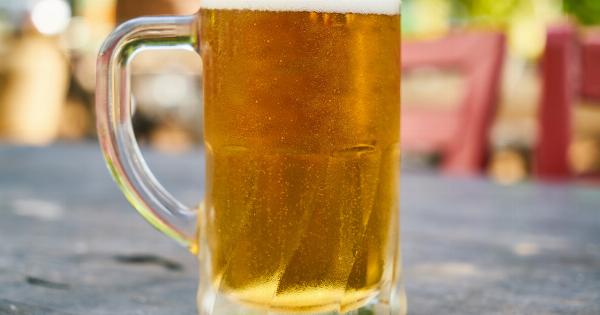As we age, concerns about cognitive decline and neurodegenerative diseases like dementia become increasingly prevalent.
While there is no surefire way to prevent conditions like dementia, research suggests that certain lifestyle choices and habits can potentially help maintain cognitive health. One surprising element that has emerged from studies is the positive association between consuming a cold beverage, such as a beer or refreshing non-alcoholic drink, and the prevention of dementia.
In this article, we will explore the evidence, benefits, and tips for enjoying a cold beverage to keep dementia at bay.
The Research: Cold Beverages and Cognitive Health
Several studies conducted over the years have found an interesting correlation between cold beverage consumption and a reduced risk of dementia.
A study published in the Journal of Alzheimer’s Disease discovered that moderate alcohol consumption, including beer, was associated with a decreased risk of dementia and cognitive decline.
Another study conducted by researchers at the University of California, San Diego, found that individuals who consumed one to two alcoholic beverages per day had a significantly lower risk of developing dementia compared to those who abstained from alcohol or consumed it excessively. The researchers hypothesized that the protective effect may be due to the antioxidants found in alcoholic beverages, particularly beer and wine, as these have been associated with improved brain health.
The Benefits of Moderate Alcohol Consumption
While excessive or heavy alcohol consumption is known to have detrimental effects on overall health, including an increased risk of dementia, moderate alcohol consumption has been linked to several health benefits.
Enjoying a cold beverage in moderation can potentially offer the following benefits:.
1. Reduced Risk of Cognitive Decline
As mentioned earlier, studies have shown that moderate alcohol consumption is associated with a lower risk of dementia and cognitive decline.
This effect is particularly evident in individuals who consume one to two alcoholic beverages per day, such as a cold beer or a glass of wine.
2. Antioxidant Power
Certain alcoholic beverages, including beer, contain antioxidants that can help protect the brain against oxidative stress.
Antioxidants are substances that neutralize harmful free radicals, which are known to contribute to cellular damage and neurodegeneration.
3. Improved Blood Circulation
Moderate alcohol consumption has been found to improve blood circulation by increasing the flexibility of blood vessels and reducing the risk of clot formation.
Proper blood circulation is crucial for delivering oxygen and nutrients to the brain, thereby supporting brain health.
4. Stress Reduction
Enjoying a cold beverage can have a relaxing effect on the body and mind, reducing stress levels. Chronically high levels of stress have been associated with an increased risk of cognitive decline and dementia.
By managing stress, one can potentially contribute to maintaining cognitive health.
5. Socialization and Mental Stimulation
Sharing a cold beverage with friends or loved ones often involves social interaction and engaging in conversation.
Staying mentally active by participating in social activities and stimulating discussions can help preserve cognitive function and potentially reduce the risk of dementia.
Incorporating Cold Beverage Consumption into Your Lifestyle
If you are interested in incorporating cold beverage consumption into your lifestyle as a potential way to support cognitive health, here are some tips:.
1. Choose Quality Over Quantity
Opt for high-quality alcoholic beverages or refreshing non-alcoholic alternatives instead of reaching for mass-produced, low-quality options. Look for beers or non-alcoholic drinks that contain natural ingredients and fewer artificial additives.
2. Practice Moderation
It’s important to emphasize moderation when it comes to alcohol consumption. Moderate drinking is considered one drink per day for women and up to two drinks per day for men.
Exceeding these limits can have detrimental effects on health, outweighing any potential benefits.
3. Seek Variety
Explore the world of craft beers or experiment with different non-alcoholic options to diversify your cold beverage choices. Trying new varieties can make the experience more enjoyable and help you discover flavors you truly appreciate.
4. Be Mindful of Health Conditions
If you have any existing health conditions or are taking medications that may interact with alcohol, it’s important to consult your healthcare provider before incorporating cold beverages into your lifestyle.
They can offer personalized advice based on your specific situation.
5. Prioritize Hydration
While enjoying a cold beverage is refreshing, it’s essential to prioritize hydration by drinking plenty of water throughout the day. Dehydration can impair cognitive function, and balancing your intake of cold beverages with water is crucial.
By following these tips, individuals can potentially enjoy the benefits associated with cold beverage consumption while minimizing any risks.
The Importance of Balance and Individual Differences
While the research on cold beverage consumption and dementia prevention is intriguing, it’s crucial to acknowledge that individual differences and overall lifestyle choices play a significant role in maintaining cognitive health.
Enjoying a cold beverage should be approached with balance, moderation, and consideration of personal health circumstances. It’s always a good idea to consult a healthcare professional for personalized advice based on your specific needs.
Conclusion
While there is still much to learn about the relationship between cold beverage consumption and dementia prevention, current research suggests that moderate alcohol consumption, including beer, may have potential benefits for cognitive health.
Antioxidants in alcoholic beverages, the promotion of socialization, and stress reduction are among the factors that may contribute to these benefits. However, it’s important to prioritize overall well-being, practice moderation, and consult with healthcare professionals before incorporating any changes into your lifestyle.
By adopting a balanced and proactive approach, you can potentially embrace the benefits of enjoying a cold beverage while taking steps towards maintaining cognitive health.





























